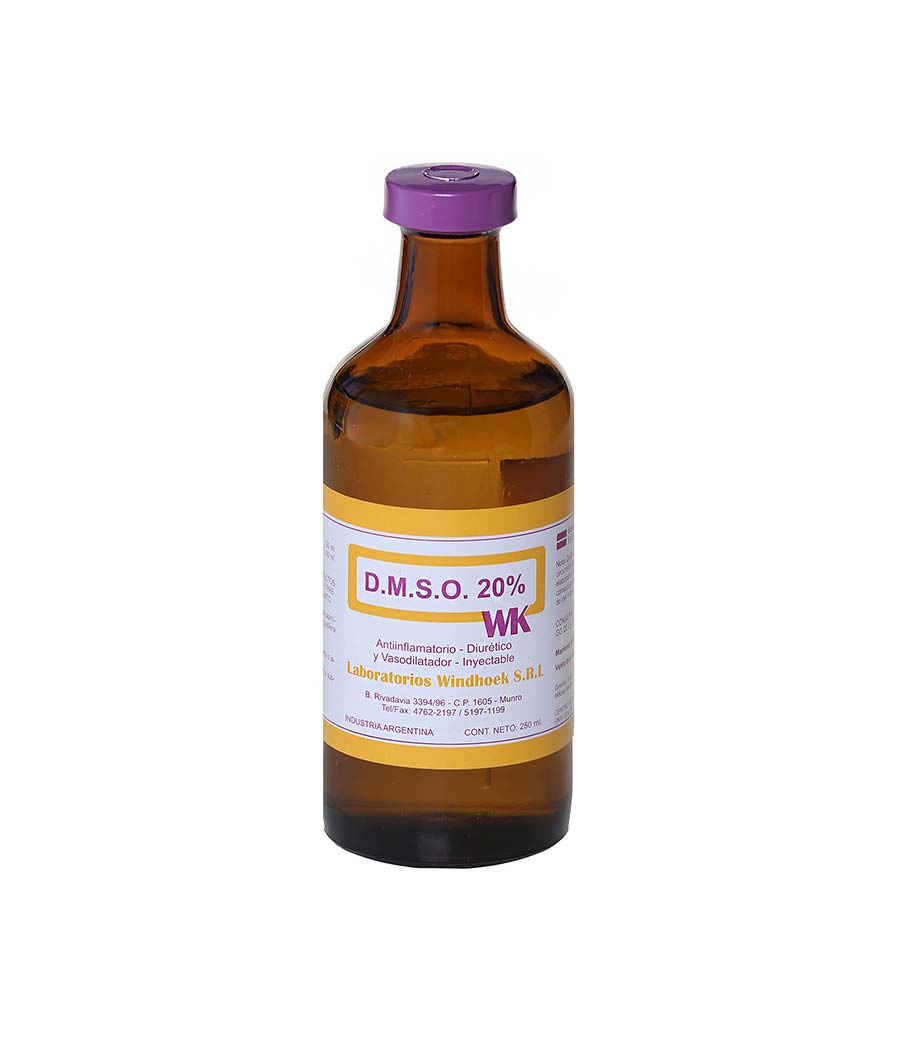Inyectable
COMPOSICION:
Dimetilsulfóxido 20 g.
Agua destilada c.s.p. 100 ml.
PRESENTACION: Frasco ampolla conteniendo 250ml.
INDICACIONES: Antiinflamatorio, diurético y vasodilatador.
Se indica como tratamiento de apoyo en las siguientes enfermedades y casos:
- Traumatismo del SNC (craneano y de la médula espinal)
- Edema cerebral secundario a la Encefalitis Equina del Este.
- Síndrome de desajuste neonatal.
- Mieloencefalomielitis protozoarica equina.
- Endotoxemia
- Cólicos
- Diarrea aguda.
- Artritis Séptica.
- EHIP.
DOSIFICACION: En los casos de afección del SNC, Síndrome de desajuste neonatal o donde
sea necesario un importante efecto antiinflamatorio y diurético, la dosis recomendada de0,5g/kg.día o sea 2,5 ml/kg.día de la solución.
Endotoxemia, laminitis, cólicos y diarrea aguda la dosis indicada es de 0,1 a 0,2 g/kg.día o sea 0,5 a 1 ml/kg.día.
Dichas dosis deben ser administradas fraccionadamente, en 2 aplicaciones diarias, cada 8 a 12 horas. En el caso del lavaje intraarticular el volumen necesario para realizar el procedimiento de acuerdo al tipo de articulación y la técnica utilizada, por tal motivo el DMSO se incluye en la solución de lavaje articular.
En la práctica, cuando se trate de afecciones menos graves, como bronquitis o EIPH, suelen ser suficientes 50ml de la solución 1 o 2 veces por día.
ADMINISTRACION: Endovenosa lenta o lavaje intraarticular. La inyección debe ser lenta, para no causar hemólisis.
CONTRAINDICACIONES Y LIMITACIONES DE USO: Debido a su débil propiedad anticolinesterasa, debe evitarse su uso concomitantemente con órgano fosforados u otros inhibidores de la colinesterasa.
No debe usarse en animales bajo anestesia, ni cuando se sospeche de fallas renales agudas o en casos de deshidratación importante. Tampoco en hembras preñadas.
EFECTOS ADVERSOS: Pueden aparecer fasciculaciones musculares, hemólisis intravascular, hemoglobinuria y sudoración.
Destinado a equinos deportivos. No debe ser administrado a animales cuyo destino final pudiera ser el consumo alimentario humano.
Conservar entre 5 y 25°C al abrigo de la luz solar directa y la humedad.
CENTRO NACIONAL DE INTOXICACIONES: 0800-333-0160 Mantener fuera del alcance de los niños. Venta bajo receta.
SENASA
Certificado N° 03-307
Uso en medicina veterinaria.
Industria Argentina.
Injectable
COMPOSITION:
Dimethyl sulfoxide 20 g
Distilled water q.s. 100 mL
PRESENTATION: 250 mL vials.
INDICATIONS: Anti-inflammatory, diuretic and vasodilator. Indicated as support treatment for the following diseases and cases:
- Trauma of the CNS (cranial and of the spinal cord).
- Cerebral Edema secondary to Eastern Equine Encephalitis.
- Neonatal Maladjustment Syndrome.
- Equine Protozoal Myeloencephalitis.
- Endotoxemia and Laryngitis.
- Colic.
- Acute diarrhea.
- Septic Arthritis.
- EIPH
DOSAGE: In cases of CNS disorders, neonatal maladjustment syndrome or where an important anti-inflammatory and diuretic effect is required, the recommended dose is 0.5 g/kg per day, that is, 2.5 mL/kg of the solution per day.
For endotoxemia, laminitis, colic and acute diarrhea, the dose indicated is 0.1 to 0.2 g/kg per day, that is, 0.5 to 1 ml/kg per day.
Such doses must be administered in 2 daily applications, every 8 to 12 hours.
When dealing with less serious disorders, such as bronchitis or EIPH , a dose of 50mL once or twice a day should be sufficient.
In case of intraarticular lavage, the volume required to perform the proceeding, according to the kind of articulation and the technique used; for this reason, the DMSO is included in the solution for articular lavage.
ADMINISTRATION: Slow intravenous route or intraarticular lavage.
To be used in sport horses. Do not administer to horses that might be used for human food consumption.
ADVERSE EFFECTS: There might appear muscular fasciculation, intravascular hemolysis, hemoglobinuria and sweating. These signs, if any, appear temporarily.
CONTRAINDICATIONS AND RESTRICTIONS OF USE: Due to its weak anticholinesterase property, its use concurrently with organophosphates or other cholinesterase inhibitors must be avoided.
It must not be used in animals under anesthesia, or when acute renal failure is presumed, or in cases of relevant dehydration.
It must not be used in pregnant mares.
CONSIDERATIONS: Since it was discovered, more than 30 pharmacological properties of the D.M.S.O have been found. The most important for Veterinary Clinic are the following:
1) Anti-inflammatory: Obviously, the main property; it produces this effect through multiple mechanisms, such as the purification of free radicals, the inhibition of polymorphonuclear cells, the lysosomal stabilization and the inhibition of fibroblastic proliferation.
2) Diuretic:
It is osmotic, and due to its nature, it drags water to the urine. It has been proved to be much more useful than furosemide or mannitol in cases of CNS edema.
3) Anti-ischemic: this action is produced through hydroxyl neutralization, its interaction with prostaglandins, thromboxane and platelet system, and due to its vasodilator ability; that is why it is indicated in intestinal ischemia situations, laminitis, etc.
4) Vascular endothelia protector: this property is mainly caused by the depuration of free radicals; it has been specially seen in endothelial cells of the CNS.
Its local analgesic effects have been compared to those produced by analgesic narcotics and it is believed that this is so because it depresses the efferent nerves conduction.
PRECAUTIONS: Use a sterile needle and syringe and make an appropriate asepsis of the application site.
The intravenous injection must be slowly applied to avoid causing hemolysis.
Do not combine with other drugs in the same syringe. At low temperature, this product may crystalize; in that case, place into a double boiler.
Due to its fast skin penetration, the use of gloves during manipulation is recommended.
Keep out of the reach of children.
SENASA Certificate N° 03-307
For Use in Veterinary Medicine
Made in Argentina

